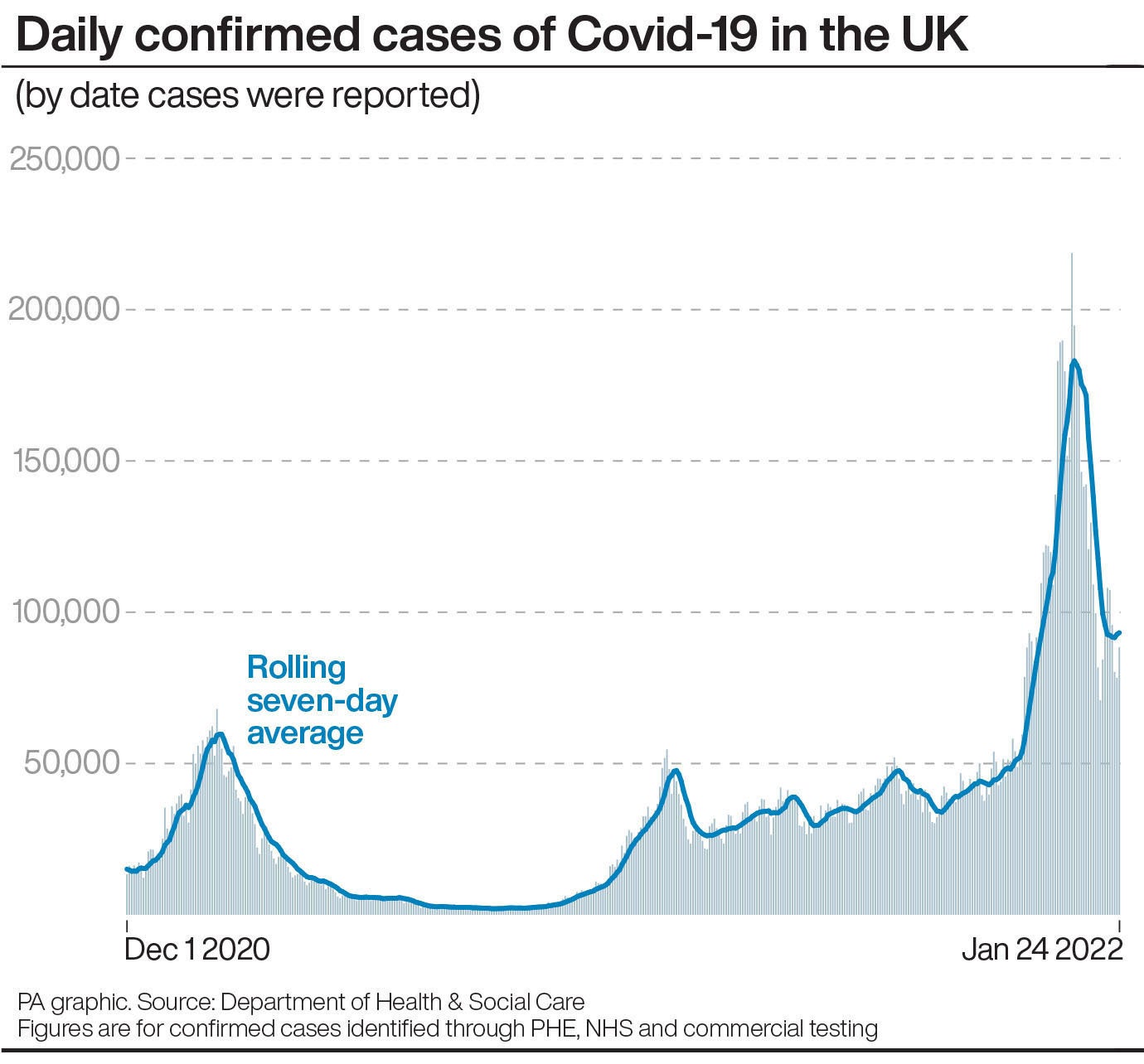
One in 20 pupils in England were absent because of coronavirus last week, with the number of pupils off school with a confirmed case doubling in a fortnight.
The Department for Education (DfE) estimates that 5.1% of all pupils were off school because of Covid on January 20, up from 3.9% on January 6 – a record high for this school year, with 415,300 pupils absent in total.
This was up from approximately 315,000 children, or 3.9%, on January 6, just after pupils returned from the Christmas break.
Covid absence figures for pupils are the worst they have been this academic year
An estimated 321,800 pupils were off with a confirmed case of coronavirus on January 20. That’s double the 159,000 off a fortnight ago on January 6 and almost triple the 110,900 off on 16 December.
A record number of teachers and school leaders were absent on January 20, with nine percent not in school, up from 8.6% on January 6, the latest data also shows.
In total, 4.5% were absent for Covid-related reasons, down from 4.9% on January 6.
Paul Whiteman, general secretary of school leaders’ union NAHT said schools are “still seeing significant levels of disruption due to Covid, with both pupil and staff absence very high”.
Our members are repeatedly telling us that they are having to drop everything to find cover and that just keeping things going is a challenge
“Covid absence figures for pupils are the worst they have been this academic year,” he added.
Mr Whiteman said schools are “struggling to keep things running”, with nearly 10% of their staff off on average.
“But for some this is much higher,” he said. “Our members are repeatedly telling us that they are having to drop everything to find cover and that just keeping things going is a challenge.”
He said headteachers are still “very much in the eye of the Covid storm” and that the disruption is causing “huge pressure” for pupils preparing to sit exams.
On Tuesday, the NAHT called on the Government to review the changes made to GCSEs and A levels this year to mitigate disruptions caused by Covid.

Currently, pupils in England will be offered a choice of topics in some GCSE exams, such as English literature, history, ancient history and geography, as well as exam aids next summer to make up for Covid-related disruption.
For subjects where a choice of topics is not provided, advance notice on the focus of exams will be released on February 7 to help with revision.
But the NAHT union said the Government needed to review its plans to make sure exams are fair for this year’s GCSE and A level cohort.
“Advance notice information should be published as soon as possible,” Sarah Hannafin, the NAHT’s senior policy advisor, said.
Geoff Barton general secretary of the Association of School and College Leaders, said that the fact nearly one in 10 teaching staff were away from school on January 20 was “of particular concern”.
“As well as the impact on affected staff themselves, this also poses significant issues for leaders in trying to ensure they can continue to provide education for all pupils, including through the use of expensive and scarce supply staff,” he said.
“They need much more help from the government to meet the mounting costs they face.”
Mr Barton added that the Government’s “unexpected announcement” last Wednesday that face coverings were “no longer recommended” in classrooms, and that from Thursday January 27 they would not be recommended in corridors and communal areas, “reduced the defences available to schools to control the spread of Covid-19”.
He added that the contingency framework guidance continued to be that face coverings could be kept or reintroduced on the advice of local public health officials and the Department for Education, either in an individual school or across a local area if there was sufficient concern about regional infection rates.
“While no one wants to see face coverings worn in schools for longer than is necessary, it is right that this should continue to be an option where public health officials believe it will help to stop local outbreaks,” he said.
On Monday, Education Secretary Nadhim Zahawi said it was the “right decision” to remove the guideline for pupils in England to wear face coverings in classrooms, but added that there would be no sanctions for headteachers who chose to keep them in place.
Speaking on BBC Breakfast, Mr Zahawi said: “I trust headteachers to do the right thing, I work very closely with them and I’m proud of that – I work very closely with directors of public health.
“Headteachers and teachers will agree that wearing masks in classrooms actually causes a communication challenge and a learning challenge, which is why I didn’t want them to be in the classroom a day longer than necessary.
“When the scientists told us that the peak had been reached on Omicron, and we are seeing a plateauing and a real reduction, for example, in ICU numbers, then it is the right decision we made to take that guideline away.”
Asked whether there would be any sanctions for headteachers who continue to mandate mask-wearing in classrooms, he replied: “No, I will work with headteachers to support them where we can.”







